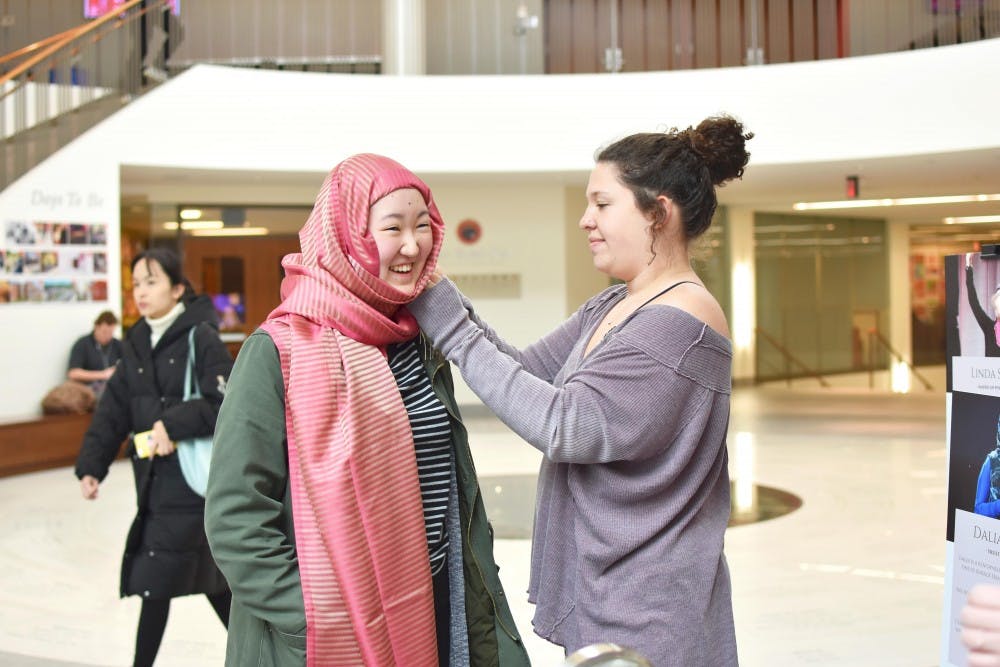"Do you want to try one on?"
First-year Jessica Enhelder and senior Elisabeth Dodd greeted me as I walked up to their table in Armstrong. On the table were about a dozen scarves in various colors and patterns -- from subdued solids to bright florals. The table was also decorated with other Islamic artifacts such as a tea set, candles and clothing.
Without a second thought, I said yes. This is definitely one of the less risky things that I could partake in on a college campus.
Jessica handed me a piece of stretchy fabric and told me to put it on like a headband. It held back my hair and covered most of my scalp. She stood facing me and began wrapping a pink scarf with pale pink stripes around my head.
There are several different ways to wear a hijab based on culture and personal preference. Some women choose to pin the ends of the scarf together for a more secure fit while others simply drape it over their head and around their neck. Some women choose to cover all of their hair while others leave some of their hair showing.
Jessica secured the scarf with a pin and stood back to let me look at myself in the round mirror sitting on the table.
I didn't expect to feel as self-conscious as I did. The girl with the pink fabric bordering her round face didn't feel like me. It was a Thursday afternoon during class, and Armstrong wasn't buzzing with students, but still I felt like people were staring at me.
I haven't quite grown out of the adolescent tendency to worry about what other people think about me. But what exactly did I think other people would think about me wearing a hijab? Was I worried that they would stereotype me? Think of me differently?
I think these concerns that I had while wearing a hijab for a mere five minutes speaks to the importance of World Hijab Day.
On Feb. 1, the Miami University American and Muslim Women's Collaboration joined over 100 other countries in celebrating World Hijab Day. This is the second time that the organization has recognized the day.
"This is not cultural appropriation; this is a celebration," said Rhonda Jackson, administrative assistant for the Women's Center. "This is a celebration of their freedom to cover or not to cover and to celebrate the Islamic faith that we all need to learn more about so that we're not so afraid and standoffish. It helps to normalize it and makes it easier for Muslim women to navigate this campus."
By giving people the opportunity to try on a hijab, the organization hoped that it would help break down the negative associations that people have with Islam and those who practice it.
Enjoy what you're reading?
Signup for our newsletter
"It becomes less of this intangible symbol and you see it as an everyday reality and something that is for beauty and expression," Elisabeth said.
The second part of the World Hijab Day celebration was a panel discussion that evening moderated by Dr. Fatima Emlemdi, visiting assistant professor in the Center for World and American Cultures. On the panel were seniors Megan Zimmerer and Helene Kabasele, both of whom have converted to Islam, and Dr. Nathan French, assistant professor in the Department of Comparative Religion. The panel served as an opportunity to dispel myths around women who wear hijabs and for people unfamiliar with Islam to ask questions.
In addition to being stereotyped as terrorists and threats, another big misconception of women who wear a hijab is that a man has forced her to do so.
"When I started putting on the hijab, people always asked me, 'Are you married?' because they're assuming that I got married and I converted to Islam because my husband is Muslim," Helene said. "But wearing a hijab has nothing to do with men. I don't wear a hijab because I feel like men are going to lust if I don't wear it. I wear a hijab because of my commitment to God."
The reason that women wear hijabs stems from modesty, though different women wear it for different reasons. Some wear it to show their Muslim identity, while others wear it to feel closer to God.
Regardless of the reason, Rhonda considers wearing a hijab "a purposeful risk."
"You never know what someone's going to say or what someone's going to do," Rhonda said. "But to honor your faith and to be purposeful about that, women are willing to take that risk and to stand up for their right to practice their faith no matter what it is. I think absolutely [the current political climate] has made [wearing a hijab] more difficult, but we see strong brave women doing it every day on our campus."
fentermc@miamioh.edu




